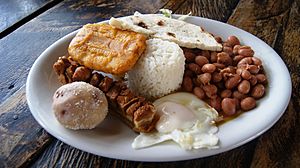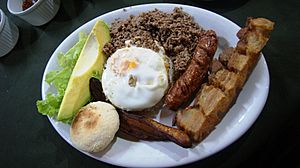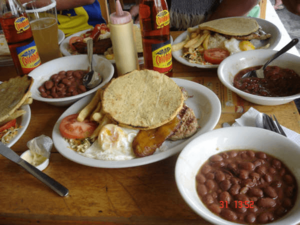Bandeja paisa facts for kids

|
|
| Alternative names | Bandeja Paisa |
|---|---|
| Course | Lunch and dinner |
| Place of origin | Colombia |
| Region or state | Paisa Region, Antioquia |
| Created by | Country side people or campesinos |
| Serving temperature | Warm, hot |
| Main ingredients | Pinto Beans, white rice, ground meat, chicharon, fried egg, plantain (patacones, tajada), chorizo, arepa, black pudding (morcilla), avocado and mazamorra |
| Variations | Bandeja de arriero |

The Bandeja paisa is a famous and very filling meal from Colombia. Its name means "Paisa platter." "Paisa" refers to people from the Paisa Region in Colombia. "Bandeja" is the Spanish word for "platter" or "tray."
This dish is a symbol of Colombian cuisine. It is especially popular in the Antioquia region and the Colombian Coffee-Growers Axis. You can also find it in parts of Valle del Cauca and Tolima.
A traditional bandeja paisa is known for having many different foods. These include red beans with pork, white rice, ground meat, chicharrón (fried pork belly), and a fried egg. It also has plantain (often plátano maduro), chorizo (a type of sausage), and arepa (a corn cake). Other parts are hogao sauce, black pudding (called morcilla), avocado, and lemon. All these foods are served together on a large platter.
Contents
What is Bandeja Paisa?
The bandeja paisa is a very large meal. It is served on a big, oval-shaped tray. This is because there is so much food! It is a main meal, usually eaten for lunch or dinner.
Main Ingredients of Bandeja Paisa
The dish is a mix of many tasty foods. Here are the main parts:
- Red beans: Cooked slowly with pork.
- White rice: A common side dish.
- Ground meat: Often seasoned beef.
- Chicharrón: Crispy fried pork belly.
- Fried egg: Usually placed on top.
- Plantain: Sweet fried plantain slices.
- Chorizo: A flavorful sausage.
- Arepa: A flat, round corn cake.
- Morcilla: A type of black pudding.
- Avocado: Fresh slices of avocado.
- Lemon: A wedge of lemon for squeezing.
How Bandeja Paisa Started
The bandeja paisa has a rich history. Its roots come from different cultures. These include the native people of Colombia, Spanish settlers, and Africans. In the 1800s, French and British people also brought their cooking styles.
The way bandeja paisa looks today is quite new. People did not write about this specific dish before the 1950s. It likely grew from simpler farm meals. Local restaurants then made it into the big meal we know now. It mixes ingredients from both the Americas and Europe. This is common in many Latin American dishes. Examples include pabellón criollo from Venezuela and gallo pinto from Costa Rica.
Different Ways to Serve Bandeja Paisa
A traditional bandeja paisa is served on a large tray. Sometimes, people enjoy it with mazamorra. This is a corn drink, like a thick soup, often served with milk and panela (unrefined cane sugar).
There are many versions of this dish. Some restaurants in Antioquia offer an "extended" bandeja paisa. This is sometimes called the "seven meats platter." It adds grilled steak, grilled pork, and liver to the usual ingredients.
In Bogotá, you can find a "diet-friendly" version. This one might use grilled chicken breast instead of pork. It might also replace black pudding with salad and chorizo with a wiener.
Bandeja Paisa as a National Dish
In 2005, the Colombian government thought about making bandeja paisa the national dish. They even suggested changing its name to "bandeja montañera" (mountain tray). This was to include people from all over Colombia, not just the Paisa Region.
However, some people did not agree. They said that only a small part of Colombia eats it regularly. They also pointed out that it came from only one region. Another dish, sancocho, was suggested as an alternative. But sancocho is eaten in many other countries. These include Cuba, Venezuela, and Puerto Rico. Because of this, some people think ajiaco is a more unique Colombian dish.
Even without official government approval, the tourism industry in Colombia uses bandeja paisa a lot. You can see pictures of it in ads, menus, and travel guides. It is shown as the most typical Colombian meal.
See also
 In Spanish: Bandeja paisa para niños
In Spanish: Bandeja paisa para niños
 | Valerie Thomas |
 | Frederick McKinley Jones |
 | George Edward Alcorn Jr. |
 | Thomas Mensah |


